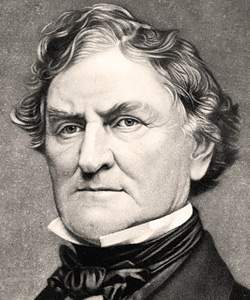William Pennington (Congressional Biographical Directory)
Reference
PENNINGTON, William, (cousin of Alexander Cumming McWhorter Pennington), a Representative from New Jersey; born in Newark, N.J., May 4, 1796; completed preparatory studies; was graduated from Princeton College in 1813; clerk of the United States district court 1815-1826; studied law; was admitted to the bar and commenced practice in Newark in 1820; member of the State general assembly in 1828; served as sergeant at law in 1834; Governor of New Jersey from 1837 to 1843; appointed Governor of Minnesota Territory by President Fillmore but declined to accept; elected as a Republican to the Thirty-sixth Congress (March 4, 1859-March 3, 1861); Speaker of the House of Representatives (Thirty-sixth Congress); unsuccessful candidate for reelection in 1860 to the Thirty-seventh Congress; died in Newark, N.J., February 16, 1862; interment in Mount Pleasant Cemetery.
"Pennington, William," Biographical Directory of the United States Congress, 1774 to Present, http://bioguide.congress.gov/scripts/biodisplay.pl?index=P000214.
William Pennington, Speaker of the House of Representatives (American National Biography)
Scholarship
When Congress assembled in December 1859, Pennington's reputation as a moderate propelled him once again. After a protracted struggle, in which Republicans and antiadministration Democrats could not agree on a House Speaker, Pennington was selected on the forty-fourth ballot. The Speaker's routine importance was magnified by the worsening relations between northern and southern representatives. Contemporaries credited the elder statesman for maintaining, as much as possible, decorum and order in a volatile congressional session, which featured congressmen armed with weapons. Historians have been harsher in their judgment, citing his refusal to appoint a sufficient number of northern Democrats and moderate Republicans (as opposed to the abundance of southern Democrats and more radical Republicans he did appoint) to the "Committee of 33," which during the secession crisis unsuccessfully sought to devise a plan to save the Union.
In 1860 Pennington narrowly lost his reelection bid with 49.4 percent of the votes cast. In a pattern repeated elsewhere in the northern part of the state, the bulk of antiadministration Democrats, who had bolted from their party in 1858, returned to the fold, fearing the consequences for the Union of a Republican victory.
In 1860 Pennington narrowly lost his reelection bid with 49.4 percent of the votes cast. In a pattern repeated elsewhere in the northern part of the state, the bulk of antiadministration Democrats, who had bolted from their party in 1858, returned to the fold, fearing the consequences for the Union of a Republican victory.
Lex Renda, "Pennington, William," American National Biography Online, February 2000, http://www.anb.org/articles/04/04-00775.html.



